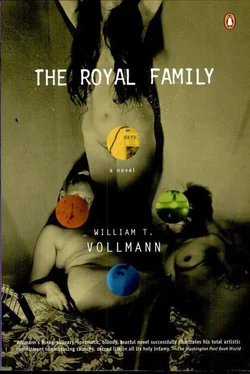But this is different. You know that, my dear.
Tyler was silent.
Henry, said his mother, gazing at him with a sad stern expression which he’d never seen before, I want to ask you something. And I want you to answer me truthfully.
I know what’s coming, her son answered with a crooked smile not unlike Domino’s.
Henry.
Yes, Mom.
Did you and Irene… Henry, did you betray John? You understand what I’m asking.
I understand pretty well, Mom.
Well?
Mom, your question humiliates me. I’ve been humiliated so much lately that I just don’t have much energy to… Can you see how it might hurt me to discuss it, Mom?
Henry, I want to know. I need to know.
It’s too late for that, said Tyler, rising.
For God’s sake! cried Mrs. Tyler, but her son, hanging his head, had already closed the door behind him. A moment later, she heard the coughing ignition of his car.
Sacramento is River City, they say, because it spreads its poisons, sterilities and occasional charms at the confluence of two rivers, but to me it remains Railroad City even if only in my wishful thinking; now it’s Car City and Mall City above all, city of hellish replications of arcades, gas stations, convenience stores, city without a heart, a strangely empty place whose downtown, once sunk down to river level, has turned its nineteenth-century boardwalks and Chinese doss houses into underground passageways invaded mainly by homeless sojourners and addicts of antique bottles (Peet’s Crystal White, The Perfect Family Soap); here, if anywhere, one might think, there’d be “meaning” or “history,” but instead one finds only rat-droppings. Aboveground they don’t care. The big developers try to keep the homeless out of their vacant lots; the city bureaucrats fine the developers whenever the homeless do get in and damage the public’s chain-link fences; and come summer most citizens get paralyzed by the ghastly sun, sitting indoors with sweat running down their cheeks — time then to go shopping or away. Come winter comes the rain, which fails to clean those graffiti-whitened fences outside the dwindling boxcar yards. The railroad tramps survive or not, uttering their wet, hacking coughs. And the street pimps sometimes use the slang phrase to pull a train, which means to mount as many women as a man desires. Meanwhile, the trains themselves crawl on ever more weakly, hidden among blackberries with flies all around. It’s been written that Sacramento only became the capitol thanks to sleazy railroad politics, whose expedient calculus of charging for freight poundage times distance required that this so-called destination city be erected in the middle of nowhere, to maximize that distance. As the city grew, so would demand; so would poundage. It all paid off. The long exposures of antique cameras show us men in top hats shaking hands, men in brimmed caps (the workers) lounging on top of locomotives. Here’s an old poster for the Sacramento Valley Railroad Company, whose trains began to run in 1856; by 1865 the Central Pacific Railroad swallowed it, running big cylindrical-nosed locomotives down J Street, locomotives non-aerodynamically boilered and belled in the dirt with their low cow-catchers pointing ahead toward progress, pale hunks of kindling in the open cars just behind. (In a photograph, a pallid figure in railroad livery stands on a high sidestep, his expression washed out to a bleak blankness like that high-noon dirt street streaked and tracked. He’s nobody; he’s Cain.) But Central Pacific, for all its locomotives’ victory wails, lost out to Union Pacific at last. And so another business lay down to sleep. Union Pacific’s yellow passenger cars whose sides read SILVER STATE and MONTEREY and SALINAS VALLEY rolled back and forth between heaven, wherever that may be, and earth, which is Sacramento, pulled by glossy black locomotives. And in innocent complacency over their attainments, the Union Pacific tycoons thought to epitomize Railroad City forever. But now in the oldest grimiest honeycombs of this commercial hive I find dead hollow boxcars; I see bleached ties between rusty tracks. The dank muffled deadness inside empty boxcars swallows history’s echoes. Who cares about history anyway? This is America. Moreover, this is California. I just read in the Sacramento Bee this morning a caution to parents selecting schools for their children: If the library contains any textbook which proclaims: Someday we will put a man on the moon, that book is not only obsolete, but dangerously obsolete, like the wide spaces between buildings and tracks in the old days. How much more so Plato and Kepler, or the near-exterminated California Indians! Everything movable, liquid, alive like long singing trains must someday become immovable like the yellow, frozen wrinkled toes in the Sacramento morgue, which are more lifeless still in juxtaposition to the humming fridge. (This place has the most amazing air flow capacity, a pathologist said to me once. The air pressure’s negative in relation to the rest of the building, you see, so there will be no odor whatsoever!) Yellow toes, and brown toes, hard and stiff, toes under clean white sheets; toes hard like ceramic or plastic, clean and stiff — that’s what we leave to our heirs before reentering the no longer track-streaked dirt we came from. Sacramento leaves its rusty railroads, inanely captioned by those who write for themselves alone. Here’s a message on a boxcar wall: CAIN WAS HERE. An old railroad bum coughs, with bronchitis in his throat. Beneath the scraped paint-layers of color on boxcars I find only cold metal, which someday must rust. Drooping palm trees, long tracks look out from rusty multi-wheeled altars. Sacramento, once I almost hated you for your ignorant plastic conformity, but your rusting boxcars remind me consolingly that all your ages are doomed. I imagine a more happy futurity when the two rivers will play around your toxic ruins, silently transmuting your follies back into dirt.
The railroad age had obtruded itself into Henry Tyler’s boyhood largely through school field trips to the train museum which lurked in the banal commercial cartoon entitled Old Sacramento. John had always liked trains better than he. The boyhood of the two brothers was naturally punctuated by family drives to caves and caverns, Sierra picnics, waterskiing, zoos, rare whitewater rafting trips when finances permitted, factory stores, burger joints. But one can hardly grow up in Sacramento without being aware of the trains. They call at night. They creep to and fro at busy intersections, irritating the drivers who wait in long lines of idling cars. They soak the gravel of the old yards with oil and creosote. The progressive city council fines, squeezes and diminishes them. — We think the Seventh Street punchline is imperative for the development of this city, I’ve heard our mayor say. We’d like an opinion on condemning this site and charging the cost to Union Pacific Railroad. — The grim, sweaty Union Pacific man grips the podium in both hands. He knows that the railroad tracks over Seventh Street are doomed. But once they’re gone for good, they’ll be loved. For now, they’re an annoyance, thwarting the energies of more evolved beings and mechanisms. John, for instance, wouldn’t have shed a tear had all the tracks been ripped out. But on the dresser in his San Francisco apartment he kept a shiny black model of a Southern Pacific locomotive. Irene used to dust it twice a month. Now John wiped it with a handerchief whenever he noticed it, which was far more often than he realized. On the mornings after she had slept there, Celia Caro sometimes emerged from the bathroom wrapped in one of Irene’s terrycloth towels to find him standing with the socks drawer open, holding the toy locomotive in his hand as he polished it caressingly, on his face a sweet and mysterious smile.
Читать дальше












